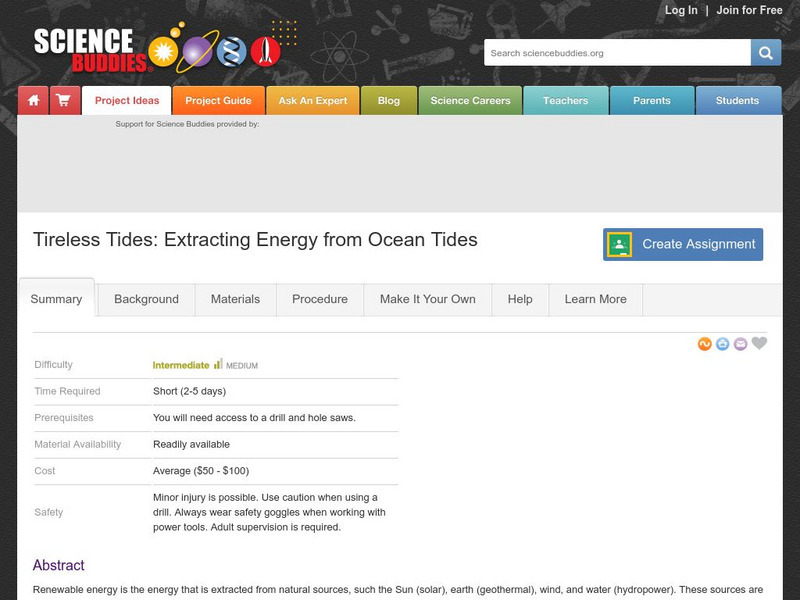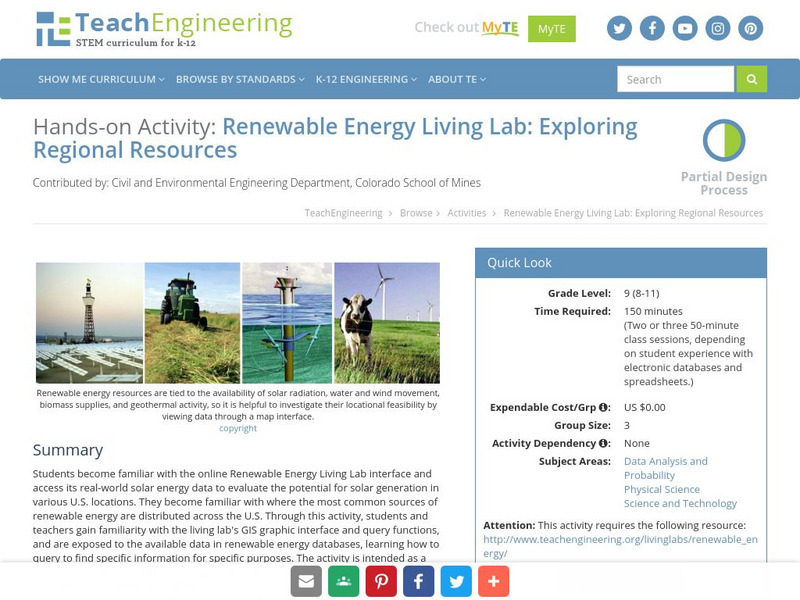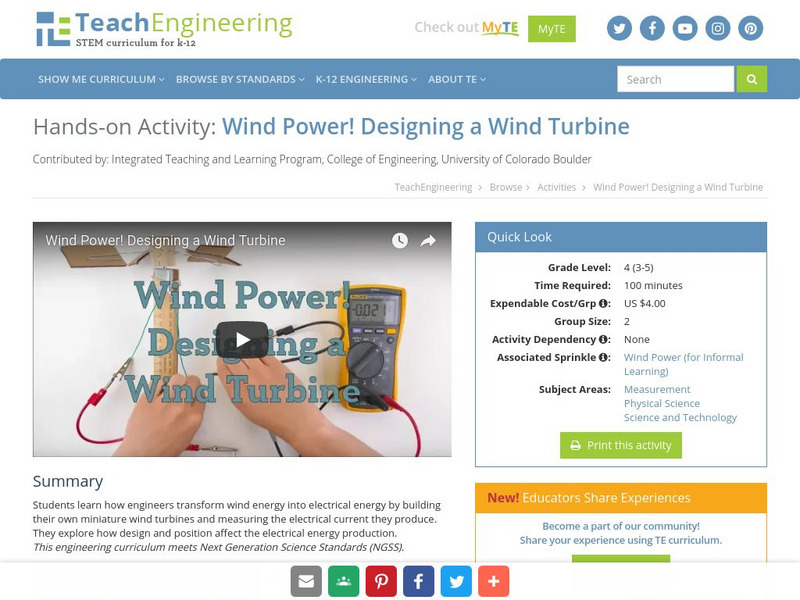Hi, what do you want to do?
Science Buddies
Science Buddies: Tireless Tides: Extracting Energy From Ocean Tides
Renewable energy is the energy that is extracted from natural sources, such the Sun (solar), earth (geothermal), wind, and water (hydropower). These sources are renewable because they can be replenished by the same natural sources within...
State Energy Conservation Office-Texas
State Energy Conservation Office: Renewable Energy and Electric Utilities [Pdf]
Discusses the state of renewable energy production in Texas, which opened the market to competition, set minimum standards for the production of renewable energy, and established a system of Renewable Energy Credits. These factors...
US Department of Energy
U.s. Department of Energy: Energy Savers
Find information on everything from buying energy-efficient products to using the proper landscaping for particular climates to conserve resources. Starting with an energy assessment, this website will help users reduce their consumption...
Other
Wuppertal Institute: Towards a Global Energy Transformation [Pdf]
This study analyzes the deepening crisis in the availability of global energy resources and looks at ways to transform how we produce and use energy in order to create a sustainable development model. They state that "Socially just and...
State Energy Conservation Office-Texas
Seco: Environmental Pollutants From Electricity Production [Pdf]
Facts about some major environmental pollutants produced by power plants, and what consumers can do to lower the carbon footprint from their energy use.
State Energy Conservation Office-Texas
State Energy Conservation Office: Solar Electricity Works for Texas [Pdf]
Discusses photovoltaic energy systems and their many applications, e.g., in telecommunications, consumer products, space technology, solar lights, etc.
TeachEngineering
Teach Engineering: Renewable Energy Living Lab
Students become familiar with the online Renewable Energy Living Lab interface and access its real-world solar energy data to evaluate the potential for solar generation in various U.S. locations. They become familiar with where the most...
Georgia Department of Education
Ga Virtual Learning: Ap Environmental Science: Energy Use and Energy Sources
This interactive learning module will focus on the fundamentals of energy and energy sources, renewable and nonrenewable, that support the human population. Students will also explore our dependence on nonrenewable fossil fuels to...
TeachEngineering
Teach Engineering: Wind Power!
Students learn how engineers transform wind energy into electrical energy by building their own miniature wind turbines and measuring the electrical current it produces. They explore how design and position affect the electrical energy...
Other
Bc Hydro: Generation System
Gives a clear explanation of how BC Hydro's electric generation system and thermal generating system work. Its transmission and distribution systems are also explained. There are maps showing where facilities and dams are located, but...
Other
Uso Eficiente De Energia Electrica
Learn about the efficient use of electric energy in Spanish. See the products and services responsible for saving energy.
US Department of Energy
U.s. Department of Energy: Energy Basics: Renewable Energy: Biomass
Find out about the renewable energy resource using biomass technologies. Learn about the three main types of biomass and how the stored energy from the sun is captured for use.
Climate Literacy
Clean: Evaluating Woody Biomass Options for North Carolina's Electricity Future
For this activity, students learn about the pros and cons of co-firing woody biomass fuels with coal to produce electricity.
US Energy Information Administration
U.s. Eia Energy Kids: Renewable Energy: Wind
Mankind has used the wind as an energy source for thousands of years. Discover other ways the wind is used to make energy.
ClassFlow
Class Flow: Thermal Energy
[Free Registration/Login Required] This flipchart reviews properties of thermal energy. Examples of Electrical energy, light waves, sound waves and conduction, convection and radiation are given.
Energy for Sustainable Development
Kids and Energy: Hydro Energy
Hydropower is a clean, renewable and reliable energy source which converts kinetic energy from falling water into electricity, without consuming more water than is produced by nature. Quite simply the oldest method by which renewable...
Science Buddies
Science Buddies: Leaky Clues to Dam Design: How Reservoir Height Affects Hydroel
It's hard to believe that the same water that you use every day to quench your thirst, cook with, bathe in, swim in, and wash your clothes and dishes, is capable of another trick-it can make electricity. Electricity can be generated...
US Department of Energy
U.s. Department of Energy: Wind Energy
This short site provides an overview of wind power, along with links to technical information on wind power, history of wind power, and more.
National High Magnetic Field Laboratory
Magnet Academy: Fluorescent Lamp 1934
Compared to incandescent lamps, fluorescent lamps last longer, require less energy and produce less heat, advantages resulting from the different way in which they generate light.
TeachEngineering
Teach Engineering: Rolling Blackouts & Environmental Impact
The goal is for the students to understand the environmental design considerations required when generating electricity. The electric power that we use every day at home and work is generated by a variety of power plants. Power plants...
TeachEngineering
Teach Engineering: Environment
Through 10 lessons and more than 20 hands-on activities, students are introduced to the concept of an environment and the many interactions within it. As they learn about natural and human-made environments, as well as renewable and...
ClassFlow
Class Flow: Earth Day
[Free Registration/Login Required] This flipchart covers significance and importance of Earth Day. Activities relate to the 3 R's, cleaning up trash, planting trees, conservation of energy and electricity, an acrostic poem, and Earth Day...






![State Energy Conservation Office: Renewable Energy and Electric Utilities [Pdf] Handout State Energy Conservation Office: Renewable Energy and Electric Utilities [Pdf] Handout](https://static.lp.lexp.cloud/images/attachment_defaults/resource/large/FPO-knovation.png)














